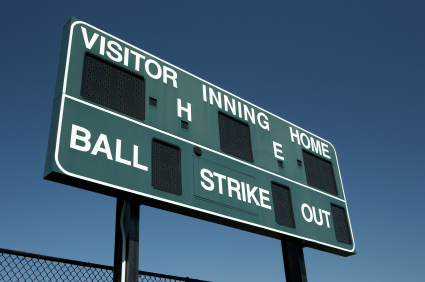The Situation:
The home team is leading handily, 7-1. At the end of the 5th inning, the visiting coach goes down to the end of the bench and tells John, usually the set-up man, to get loose while the team hits and that he will be entering the game to pitch the bottom of the 6th. John has been hit around a little bit his last few outings and he takes his coaches directive to pitch in what he considers ‘meaningless innings’ as a sign of a demotion. He begrudgingly heads down to the bullpen, incensed by the idea that he would pitch now. He is so angry, he doesn’t go through his normal in-game warm-up routine in the pen. Instead, he is thinking about what his coach thinks of him and how he doesn’t deserve to be treated like an ‘up big, down big’ arm. When the top half of the inning ends, he takes his ‘who cares’ attitude with him to the mound.
The Play:
John’s problem recently has been his command. He has been leaving too many balls over the middle of the plate. Instead of working to correct that, he is overthrowing everything. His warm-up on the mound is anything but pretty. After a leadoff walk on 4 uncompetitive pitches, John toes the rubber and gets the sign for a fastball away. He checks the runner and delivers, overthrowing the pitch in an attempt to throw it as hard as he can. The fastball stays up and a bit arm-side, right over the middle of the plate. The right-handed batter turns on it and at the crack of the bat, everyone in the park knows it’s gone. The ball sails through the night and over the left field fence. The reality of the home run sinks in and John snaps out of his funk. He retires the next three hitters in order on 8 pitches and slinks back to the dugout.
The Outcome:
In the top of the 7th, John’s team awakens from their offensive slumber. They score 4 runs that inning and 3 more in the 8th. In the top of the 9th, they threaten, putting runners on 1st and 3rd with two outs, but a deep fly ball ends the game 9-8. The comeback bid falls short.
What Went Wrong:
The glaring mistake here is that John “played the scoreboard”. In other words, he let the scoreboard dictate his effort. He thought the game was out of hand, so he stopped playing hard and gave up on the process and preparation that was most likely to lead to success. In the end, the walk and home run he gave up due to his negligence and poor attitude were the difference between winning and losing the game.
When things aren’t going well, the easy thing to do is throw in the towel or stop playing hard. It’s a protective mechanism for when things get hard. You can blame the failures on the fact that “you weren’t trying your hardest”. The truth is, these are just excuses and there is never an excuse to give anything less than 100% effort. You owe it to your team. A great example of this is the Super Bowl between the Patriots and Falcons. When the Patriots were down 25 points with 8 minutes left in the 3rd quarter, everyone in America thought the Falcons had it in hand. But the Patriots never gave up, never played the scoreboard or let their frustrations stop them from doing their job. In the end, they were rewarded with one of the most improbably comebacks in sports history. On the flip side, if you are winning big, you should never let up on your effort. Your strategy may change, but your effort should not. Let the Super Bowl be a lesson to you, regardless of the score, there is never a time when it is okay to stop trying or ‘play the scoreboard’. You ALWAYS need to think the game!







